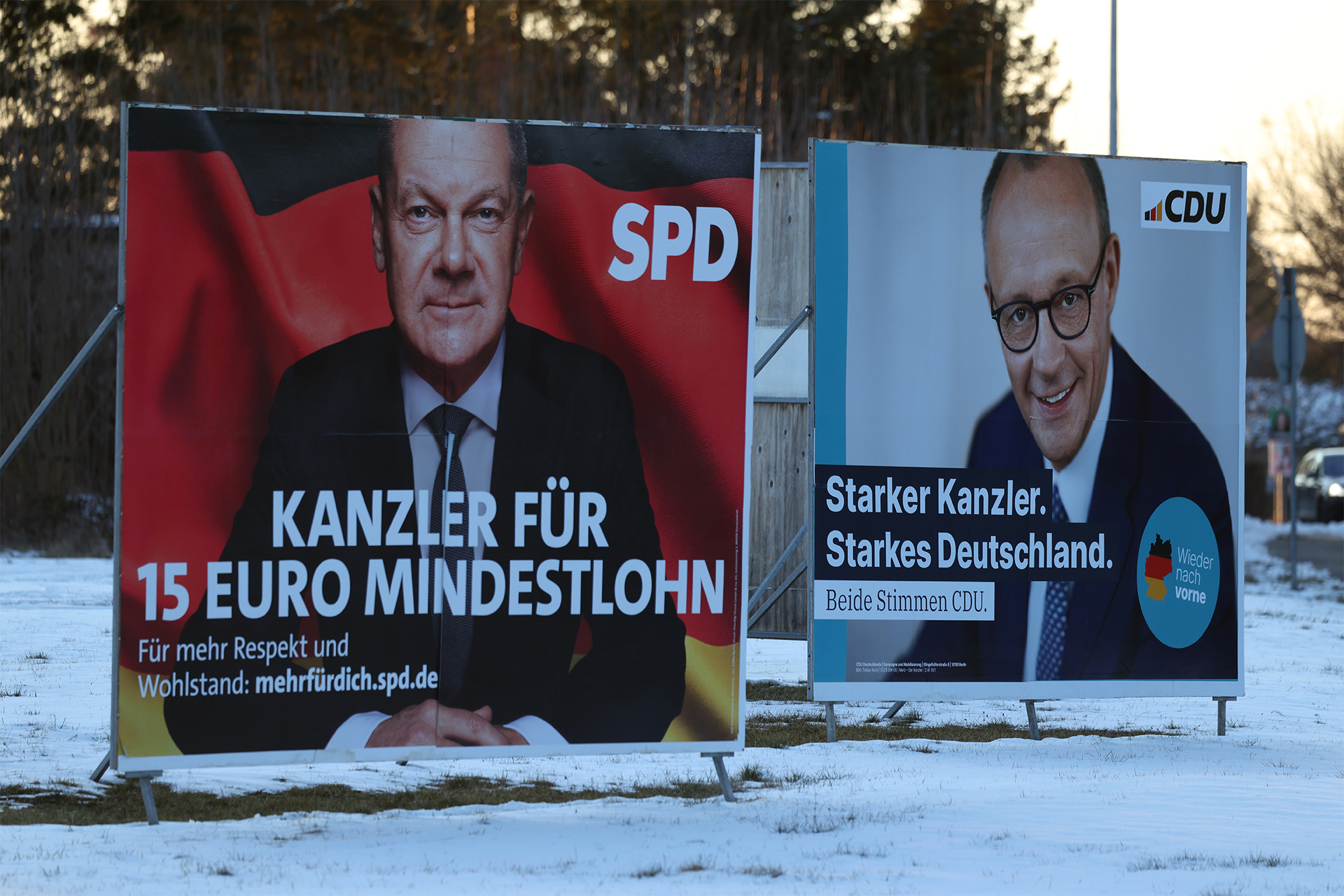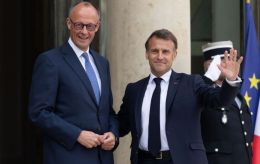Who will replace Scholz? Germany’s upcoming elections and their impact on Ukraine
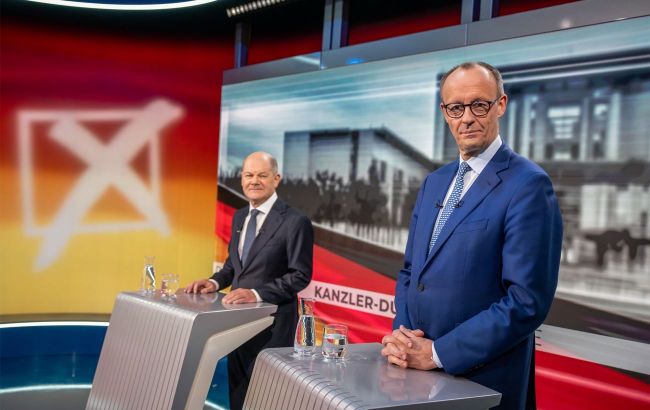 German Chancellor Olaf Scholz and opposition leader Friedrich Merz (Photo: Getty Images)
German Chancellor Olaf Scholz and opposition leader Friedrich Merz (Photo: Getty Images)
This Sunday, February 23, early parliamentary elections will take place in Germany. They are expected to provide answers about Berlin’s future strategy amid the Russian war and pressure from the United States.
Contents
- Rating intrigues
- Emotional aspect and migration issue
- Coalition options and cold calculations
- War and support for Ukraine
Elections in Germany are taking place in turbulent times. The country is in the midst of a political crisis - three ruling parties (the Social Democrats led by Chancellor Olaf Scholz, the Greens, and the Free Democrats) have failed to either maintain their coalition or address the challenges facing Germany and Europe. In addition to Russian aggression against Ukraine, there is now also the tough policy of new US President Donald Trump, who seeks to ignore European (and Ukrainian) interests in negotiations with Russia.
All of that makes this year’s elections more important than ever. The new German government will have to quickly address new problems while also overcoming old ones. There is the will and intention to do so, but the implementation is far from clear. Partly because these are among the most unpredictable elections in modern German history.
Rating intrigues
After four years in opposition, the Christian Democrats (CDU/CSU) have a strong chance of returning to power. According to a ZDF-Politbarometer poll, they currently hold the highest ratings - 30%. They are followed by the far-right, and according to many experts, neo-fascist, Alternative for Germany (AfD) with 20%. Members of the current coalition, the Social Democratic Party and the Greens, have 16% and 14%, respectively.
Intrigue is heightened by the fact that, for the first time in many years, three parties are on the verge of passing the parliamentary threshold - the Left, the Sahra Wagenknecht Alliance (which split from the Left), and the Free Democratic Party.
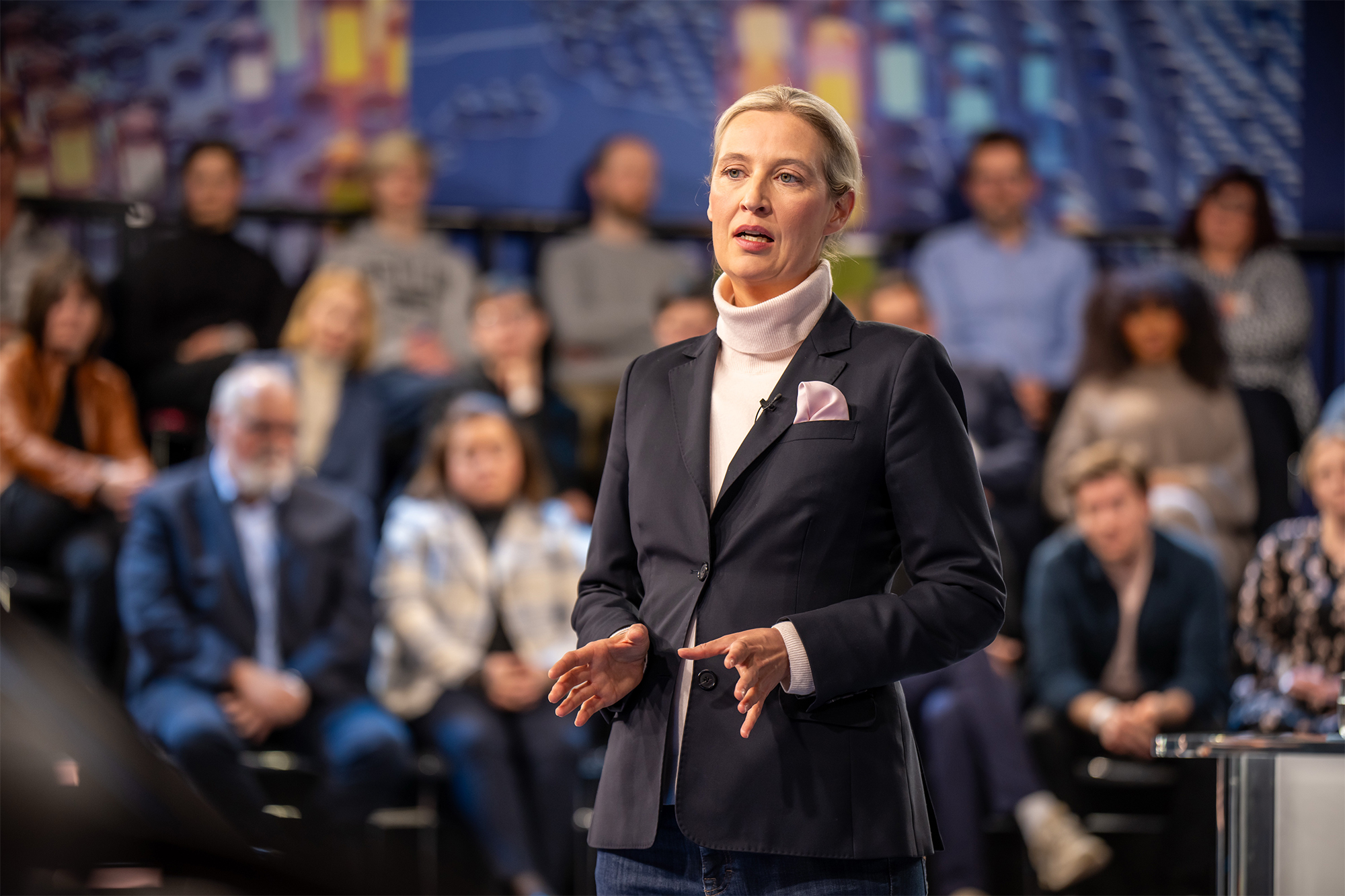
The leader of Alternative for Germany, Alice Weidel, during the February 13 debates (Photo: Getty Images)
The Left Party has the best chance of remaining in parliament, as they have played on public dissatisfaction with the government’s social policies, especially among young people. Their ratings have recently been rising. The other two parties, however, are struggling, says political scientist Viktor Savinok from the Institute for Western Affairs in Poznan.
“The Free Democrats are paying for their participation in Olaf Scholz’s government with their current ratings. On the one hand, voters likely want to punish them for contributing to the collapse of the ruling coalition. On the other hand, while most of the population is worried about their well-being, the Free Democrats are promising tax cuts primarily for the wealthy. Naturally, this does not resonate with most people,” Savinok told RBC-Ukraine.
The Sahra Wagenknecht Alliance tried to position itself as an Alternative for Germany, but with a greater emphasis on social policy. To some extent, this worked during local elections last September in three eastern German states. However, voters now prefer the "original" over a "copy." Besides, Wagenknecht’s campaign has focused on foreign policy issues, which do not strongly resonate with the public.
Meanwhile, 28% of voters remain undecided, according to ZDF. The situation is further complicated by the high level of interest in the elections - 87% of respondents indicated they are closely following developments (compared to 76% in the previous elections), suggesting a high turnout.
According to a YouGov poll from February 18, 13% of Germans plan to make their decision in the coming days, while 7% will decide on election day.
Emotional aspect and migration issue
This year’s election campaign in Germany revolves around three key themes: migration, the economy, and security, former Ukrainian consul in Munich and current chancellor of the Ukrainian Free University, Dmytro Shevchenko, told RBC-Ukraine.
“The authorities claim they did everything right, that they had no alternatives. CDU/CSU, of course, criticizes them. Protest sentiments among the population are high, as reflected in the ratings of Alternative for Germany,” he said.
The migration issue has long been on Germany’s agenda. After the large wave of refugees from Syria in 2015, others followed - from various African, Middle Eastern, and Asian countries. Since 2022, Ukrainian refugees have also been added to the mix. The issue has been further inflamed by a series of terrorist attacks in Germany in recent times.
Before Christmas, a Saudi Arabian national drove a car into a crowd at a Magdeburg market, killing five people and injuring over 200. On January 23, in the city of Aschaffenburg, a knife attack left two dead, including a two-year-old child, and three others injured. The perpetrator was an Afghan national.
Even before the start of the Munich Security Conference, security concerns were high. On February 13, an Afghan asylum seeker drove into a trade union demonstration, seriously injuring three dozen people and killing two, including a two-year-old child.
Traditionally, Alternative for Germany has gained political points on migration and security issues. However, this time, the Christian Democrats have also taken up the issue. After the Aschaffenburg attack, their leader, Friedrich Merz, introduced a parliamentary bill proposing stricter measures, including allowing federal police to deport foreigners ordered to leave Germany.
The problem is that Merz’s party is in opposition, and coalition members refused to support the initiative for various reasons. The only ones who backed Merz were Alternative for Germany, nearly causing a political upheaval. Until now, German politicians had a consensus: no cooperation with AfD under any circumstances. By accepting their support, Merz broke this taboo.
For now, there is no immediate cause for alarm - the bill was ultimately rejected. Merz faced criticism both within his party and from political opponents and society. On February 2, 160,000 people took to the streets in Berlin to protest against CDU/CSU’s cooperation with AfD. So far, the consensus against the far right remains intact.
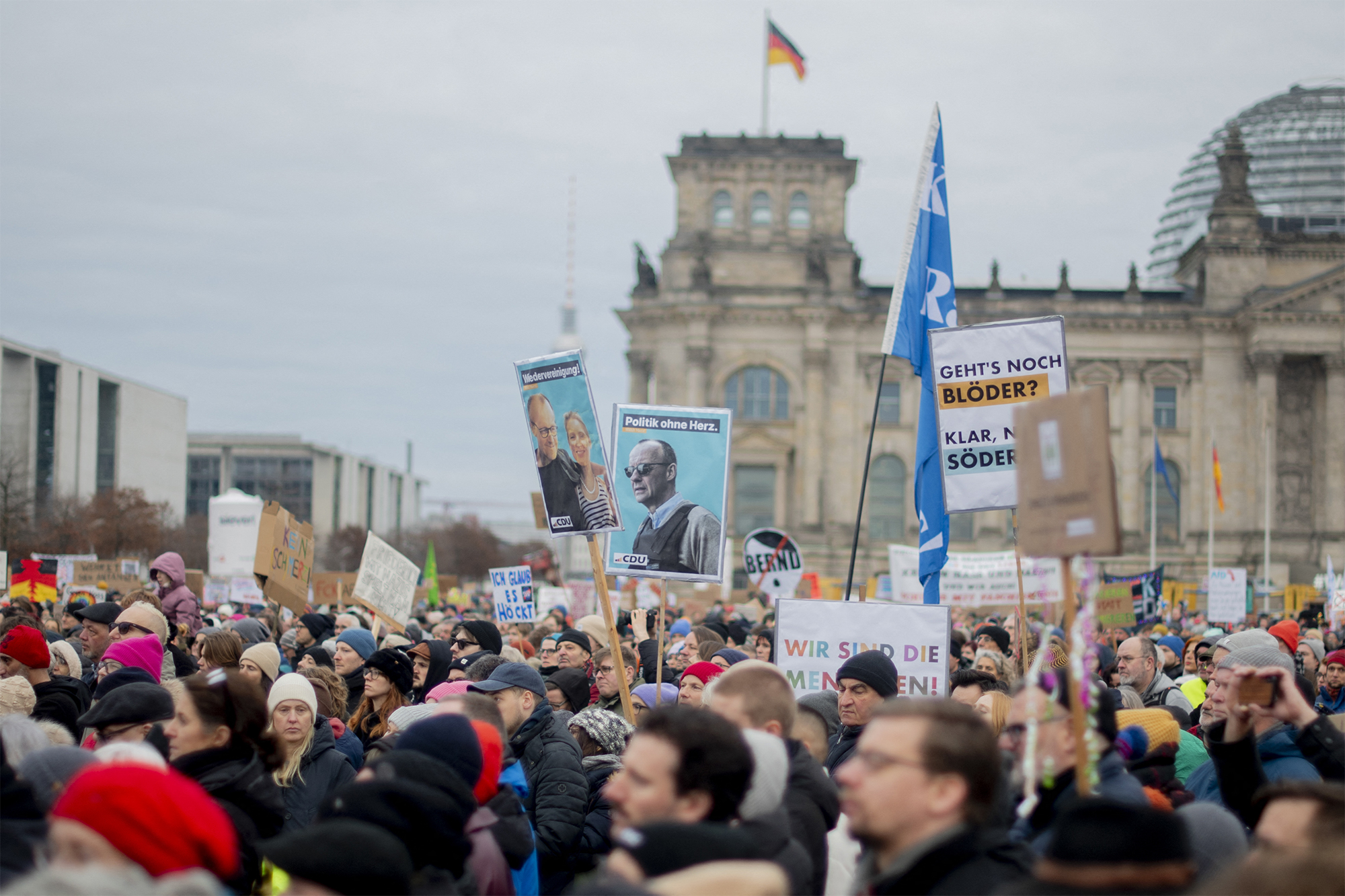
Rally in Berlin against the CDU/CSU's cooperation with Alternative for Germany (photo: Getty Images)
Of course, there is still the Trump factor. After winning the US election, the new president's team began to openly support the AfD. Trump's close ally Elon Musk conducted an online interview with party leader Alice Weidel on his X platform. At the Munich conference, US Vice President J.D. Vance criticized German parties for refusing to cooperate with the AfD, and then met with Weidel in person. However, so far it seems that such steps are more likely to mobilize opponents of the far right than to increase their popularity.
All parties understand the problem of migration. And it's not just about the security. “It is relatively clear to everyone that migration policy, combined with the rather generous social policy of the German state, has led to a crisis. Because there are a lot of refugees and “social migrants” (those who receive social benefits). There are also a lot of economic migrants, but they are profitable. The state is still holding out for now, but everyone understands that it cannot go on like this for long,” Dmytro Shevchenko said.
This is also important in the context of about a million Ukrainian refugees in Germany. “The CDU and the Free Democrats are talking about reducing benefits for Ukrainians. In fact, everyone is talking about additional motivation, that is, roughly speaking, forcing them to go to work,” the RBC-Ukraine source added.
Coalition options and cold calculations
It is already clear that the Christian Democrats will win the most seats, virtually guaranteeing Friedrich Merz the chancellorship. However, he also needs a coalition - and as of now, it is unclear who will become potential partners for the CDU/CSU.
"The greatest demand, both within these parties and in society, is for a CDU/CSU coalition with the Free Democrats. Unfortunately, it is impossible. The Free Democrats, even if they pass the five-percent threshold, are unlikely to gain enough votes," Shevchenko emphasized.
Another option is a grand coalition between the CDU/CSU and the Social Democrats. However, judging by the ratings, the two parties may not have enough mandates. It is likely that a third party will have to be involved in the coalition, which would inherently make such an alliance unstable.
Even between the two main parties, there are significant disagreements on the second most important issue for Germans - the economy. For the second year in a row, Germany has been experiencing an economic downturn. There are many reasons for this, from the rising costs of energy resources, which were previously purchased cheaply from Russia, to competition on global markets with China and other factors. This is already a problem. Furthermore, in the future, extra funds will need to be allocated for defense and security, as demanded by both the European Commission and Trump, within the framework of revising Germany's NATO obligations.
The Social Democrats propose social spending to stimulate the economy. For example, according to their plan, the state would reimburse 10% of private investments in production expansion or modernization. They also promise stable pensions, reduced tax burdens for families with children, protection against layoffs, and an increase in the minimum wage. Scholz’s party wants to finance all this essentially by borrowing. However, this would require the repeal of the so-called debt brake, a constitutional restriction in Germany that prevents unnecessary increases in public debt.
Merz and the Christian Democrats propose a different approach. Their program includes a major tax reform aimed at reducing payroll deductions from 48% to 40%, lower taxes for entrepreneurs, an increase in the top income tax bracket and the non-taxable portion of income, and several other measures. All this does not align well with Scholz’s ideas.
Given that mainstream parties do not have many options, the limits of compromise may be quite broad. Moreover, grand coalitions are common practice in Germany.
"We saw this throughout Merkel’s chancellorship. Let me remind you, 12 out of her 16 years in office were years of a grand coalition. So, despite these differences, we cannot rule out that they will come to an agreement. A key issue that will arise during these negotiations, if they happen, is the future of the constitutional provisions regarding the debt brake," Savinok noted.
Campaign posters. On the left - Scholz with the slogan "Chancellor for a €15 minimum wage." On the right - Merz with the slogan "Strong Chancellor. Strong Germany" (photo: Getty Images)
If the Free Democrats enter parliament, forming a grand coalition with their participation will be easier. If they do not make it into the next legislature, the only remaining potential partner is the Greens, who traditionally have more left-leaning views. Yet, such a coalition is also possible.
"There are examples, and they are quite successful. The most illustrative one is Baden-Württemberg, where at the state level, the CDU and the Greens formed a government together and pursued a fairly successful policy," Shevchenko noted.
All this makes party alliances extremely unwieldy. Coalition members constantly have to seek compromises, which means the absence of radical reforms in domestic policy and the economy. How this works is clearly visible in the example of Scholz’s current government.
War and support for Ukraine
For Kyiv, there is good news. Practically all mainstream parties understand the security challenges facing Europe and the need to support Ukraine.
"In terms of security policy, the Munich Security Conference was a wake-up call for Germany and Europe - it made them realize they need to think more about their own security architecture, invest in defense and security. And this also concerns the war in Ukraine," Shevchenko said.
Scholz’s stance on supporting Ukraine is well known. Under his chancellorship, Germany has become Ukraine’s second-largest donor in terms of financial aid. Yet, Scholz has been reluctant to provide Ukraine with weapons that could change the situation on the battlefield. For example, he has not agreed to supply long-range Taurus missiles.
The Christian Democrats have been more decisive, at least in their rhetoric. Merz regularly criticizes Scholz precisely for his indecisiveness. On January 24, he stated that ending Russia’s war against Ukraine would be one of the strategic priorities of the government he leads. Merz emphasized that Ukraine needs to "win the war."
"Victory means restoring territorial integrity with a democratically legitimate government exercising its own state sovereignty," Merz said.
According to him, Ukraine should be free to choose its political and military alliances, clearly implying its path toward the EU and NATO.
From this perspective, the German elections should bring positive changes for Ukraine. However, these changes need to happen quickly. And Berlin is not used to that. In a situation where the international landscape is shifting daily by the actions of Putin and Trump, delays could be dangerous. Especially considering that all of Europe is watching Germany’s position, and a scenario of prolonged coalition negotiations in Europe’s leading economy is the worst possible outcome.
Sources: data from ZDF and YouGov polls, articles from Frankfurter Allgemeine Zeitung, Handelsblatt, DW, Spiegel, and comments from former Ukrainian consul in Munich, Chancellor of the Ukrainian Free University Dmytro Shevchenko, and international political scientist, analyst at the Institute for Western Affairs in Poznań, Viktor Savinok.
